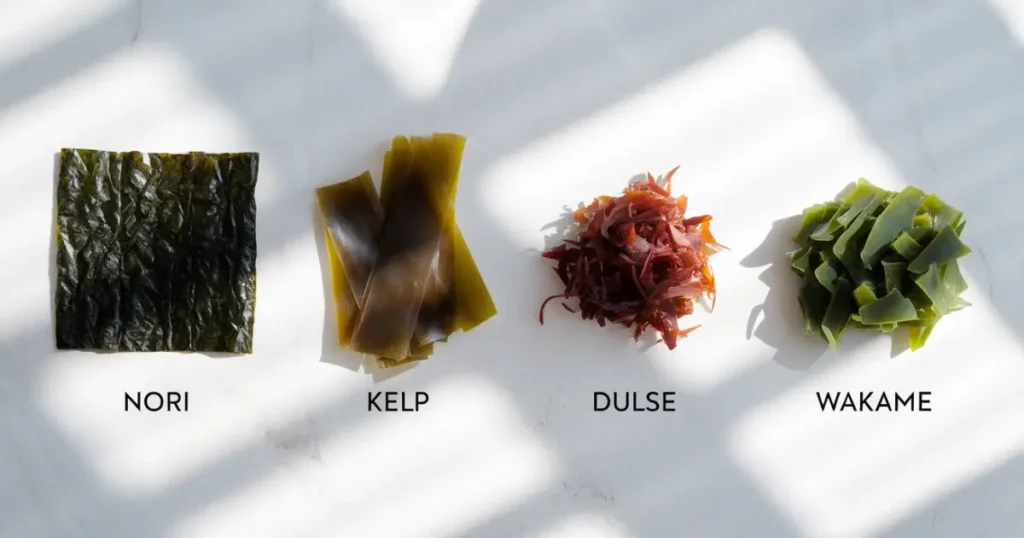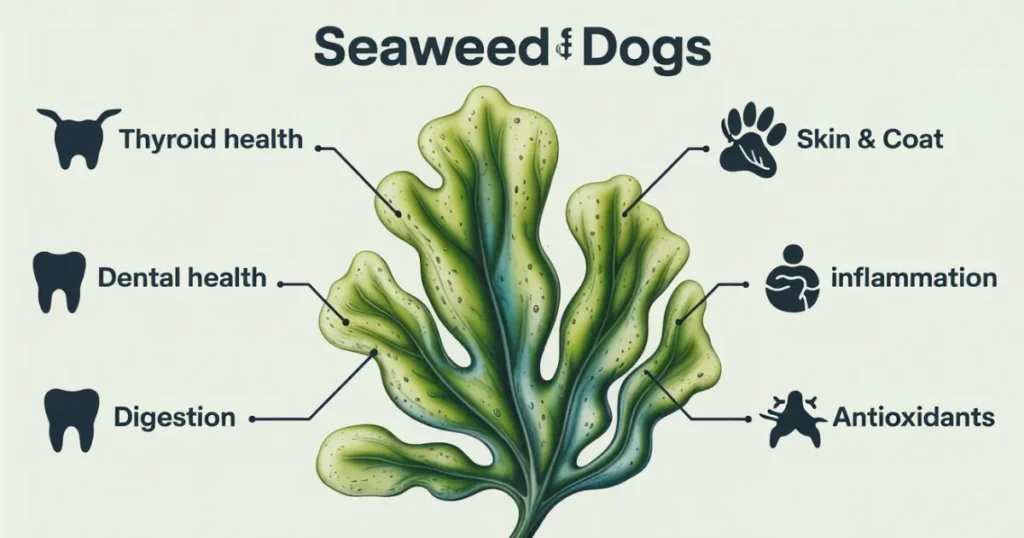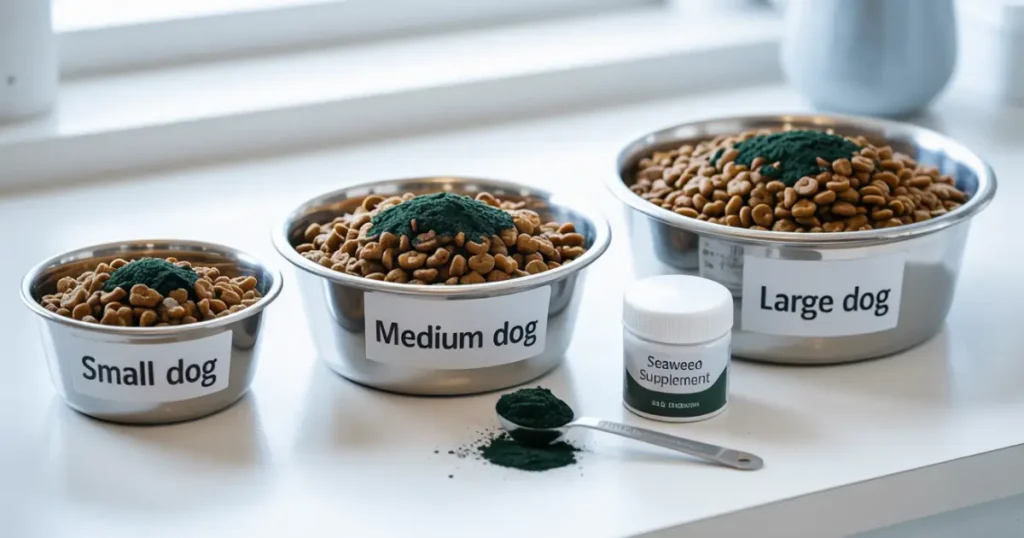Can Dogs Eat Seaweed? Safety Guide + Serving Chart (2025)
Quick Answer: Can Dogs Eat Seaweed?
Can dogs eat seaweed? Yes, but only certain types in small amounts. Here’s what you need to know:
SAFE SEAWEED TYPES:
- Plain nori sheets (sushi wrapping)
- Commercial kelp powder (unseasoned)
- Dog-specific seaweed treats
DANGEROUS TYPES:
- Wild beach seaweed (can cause blockages)
- Seasoned human snacks (garlic, onions, salt)
- Fresh/raw ocean seaweed
Emergency: If your dog ate wild beach seaweed, contact your veterinarian immediately, as it can expand and cause intestinal blockages.
Pet owners often wonder, “Can dogs eat seaweed?” as they investigate wholesome ways to supplement their dog’s diet. Seaweed, a nutrient-dense marine plant, has gained popularity in human nutrition and is now catching attention in the pet food world. The answer to “Can dogs eat seaweed?” is yes, with important qualifications. Seaweed can offer several health benefits for your furry friend when provided in the right forms and amounts. This comprehensive guide explores everything you need to know about seaweed for dogs, from nutritional benefits to potential risks.
Table of Contents
What Is Seaweed?
Before determining if can dogs eat seaweed safely, it’s helpful to understand what seaweed actually is. Seaweed is the collective term for thousands of marine plants and algae species that grow in lakes, rivers, and oceans around the world. These plants are typically categorized into three main groups:
- Brown seaweeds: Including kelp and wakame
- Red seaweeds: Including dulse and nori
- Green seaweeds: Including sea lettuce and chlorella
When pet owners ask, “Can dogs have seaweed?” it’s important to note that different varieties offer different nutritional profiles and potential benefits. Not all seaweeds are equally beneficial or safe for canine consumption.
Common Types of Seaweed for Dogs

Let’s explore the most common types of seaweed that might be appropriate for canine consumption:
Nori
Perhaps the most well-known seaweed to most people is nori, which is frequently used to wrap sushi. When considering whether can dogs eat seaweed snacks, nori is often the safest option.
Benefits: Nori contains protein, vitamins A, B, C, and E, along with minerals like iodine, iron, and calcium. It’s relatively low in sodium compared to other seaweeds.
Safety: Plain, unseasoned nori sheets in small amounts are generally safe for dogs. Many commercially available seaweed for dogs contains nori as the primary ingredient.
Kelp
Kelp is a large brown seaweed that grows in underwater “forests” in shallow ocean areas.
Benefits: Rich in iodine, which supports thyroid function, kelp also provides iron, calcium, and various B vitamins. Many pet owners interested in is seaweed good for dogs often look to kelp supplements specifically.
Safety: Kelp is generally safe in appropriate amounts but can cause issues if over-supplemented due to its high iodine content. Always use measured amounts.
Dulse
Dulse is a red seaweed that has a unique flavor that is sometimes characterized as mildly peppery.
Benefits: Contains high levels of protein, iron, and potassium while being naturally lower in sodium than some other seaweeds.
Safety: Generally considered safe in small quantities, though less commonly used in commercial dog products than nori or kelp.
Wakame
Wakame is a brown seaweed that is frequently added to miso soup.
Benefits: high in calcium, iron, omega-3 fatty acids, and other vitamins.
Safety: Can be given in very small amounts, but its high salt content means it should be used sparingly.
While seaweed supports hydration through its mineral content, some dogs may prefer more moisture-rich vegetables like cucumbers, which are over 95% water and provide a refreshing, hydrating crunch.
Critical Safety Alert: Wild vs. Commercial Seaweed
When asking “can dogs eat seaweed safely,” the TYPE matters more than anything else:
NEVER ALLOW:
- Beach Seaweed: Dried seaweed found on shores can expand 5-10x in your dog’s stomach
- Wild Ocean Harvests: May contain pollutants, bacteria, or toxic algae
- Human Snack Products: Often contain garlic, onions, or excessive salt
EMERGENCY SIGNS (Wild Seaweed Consumption):
- Vomiting or retching attempts
- Abdominal pain or bloating
- Inability to defecate
- Lethargy or restlessness
- Loss of appetite
Action Required: Contact your emergency vet immediately if these symptoms appear within 24 hours of seaweed consumption.
THYROID CAUTION:
Dogs with existing thyroid conditions should NOT consume seaweed without veterinary approval due to high iodine content.
8 Health Benefits of Seaweed for Dogs

When pet owners investigate “is seaweed good for dogs,” they’ll discover these potential benefits:
1. Supports Thyroid Health
Thyroid function depends on iodine, which is abundant in seaweed, especially kelp. In dogs, the thyroid gland controls growth, metabolism, and development. For pets with insufficient iodine in their regular diet, controlled amounts of seaweed can help support normal thyroid function.
How it helps: Helps maintain proper metabolism and energy levels through thyroid support.
Consideration: When giving seaweed to dogs, moderation is key because too much iodine might be harmful.
2. Rich Source of Minerals
Asking “Can dogs eat seaweed?” often leads to discussions about mineral content. A great variety of minerals can be found in seaweed, including:
- Calcium for bone health
- Iron for healthy blood cells
- Magnesium for muscle and nerve function
- Zinc for immune support
- Potassium for heart and muscle function
These minerals work together to support various bodily functions in your canine companion.
How it helps: Provides trace minerals that may be missing from commercial dog foods, supporting overall health.
Consideration: Quality commercial dog foods are already formulated to provide necessary minerals, so seaweed should be considered a supplement, not a replacement.
3. Promotes Dental Health
Some types of seaweed for dogs contain compounds that may help reduce plaque buildup on teeth.
How it helps: The natural enzymes and minerals in certain seaweeds can help break down plaque and provide gentle abrasion when chewed.
Consideration: While potentially beneficial, seaweed is not a replacement for regular dental care including brushing and professional cleanings.
4. Supports Skin and Coat Health
The fatty acids and vitamins in seaweed can contribute to healthier skin and a shinier coat.
How it helps: Provides nutrients that support skin cell regeneration and coat luster.
Consideration: Results vary by dog, and some may show more noticeable improvements than others.
5. Contains Natural Anti-Inflammatory Properties
Many pet owners wondering if can dogs have seaweed are pleased to learn about its anti-inflammatory benefits. Certain compounds in seaweed, including fucoidan found in brown seaweeds like kelp, have demonstrated anti-inflammatory properties.
How it helps: May help reduce inflammation associated with allergies, arthritis, and other inflammatory conditions.
Consideration: While potentially beneficial, seaweed shouldn’t replace prescribed medications for inflammatory conditions without veterinary consultation.
6. Aids in Digestion
Seaweed contains soluble fiber that can support digestive health.
How it helps: The fiber in seaweed acts as a prebiotic, feeding beneficial gut bacteria and supporting overall digestive function.
Consideration: Too much can cause digestive upset, so starting with very small amounts is recommended.
7. Provides Antioxidant Protection
Seaweed contains various antioxidants that help combat oxidative stress and cellular damage.
How it helps: Antioxidants neutralize free radicals in the body, potentially reducing the risk of certain diseases and supporting overall health.
Consideration: While beneficial, antioxidants from seaweed should complement, not replace, a balanced diet.
Seaweed’s antioxidant properties work to combat oxidative stress, much like artichokes, which contain different but equally beneficial antioxidant compounds that can support your dog’s cellular health.
8. Supports Weight Management
The fiber in seaweed can help dogs feel fuller while adding minimal calories to their diet.
How it helps: May aid in weight management by providing satisfaction with fewer calories.
Consideration: Seaweed alone isn’t a weight loss solution and should be part of a comprehensive approach to weight management under veterinary guidance.
The fiber in seaweed aids digestion similarly to other crunchy vegetables like jicama, which offers a prebiotic fiber that can support your dog’s gut health in a different but complementary way.
Potential Risks of Seaweed for Dogs
While the answer to “can dogs eat seaweed?” is generally positive, there are important risks to consider:
Wild Seaweed Dangers
Seaweed found on shorelines or beaches should never be fed to dogs. When asking “can dogs eat seaweed?” it’s crucial to distinguish between prepared, food-grade seaweed and wild seaweed.
Why it’s dangerous:
- Wild seaweed can contain pollutants and harmful bacteria
- Dried wild seaweed can expand in the stomach, causing blockages
- Beach seaweed may be attached to fishing line or other hazardous objects
- It may contain dangerous levels of salt or contaminants
Emergency signs: If your dog consumes wild beach seaweed, watch for vomiting, diarrhea, abdominal pain, lethargy, loss of appetite, or difficulty defecating. Get in touch with your veterinarian right away if these symptoms appear.
Excessive Iodine
Seaweed, especially kelp, is extremely rich in iodine. While some iodine is essential for thyroid function, too much can cause thyroid problems.
Risks: Excessive iodine can lead to hyperthyroidism or hypothyroidism if consumed regularly in large amounts.
Prevention: Only offer small amounts of seaweed and avoid daily supplementation unless specifically recommended by your veterinarian.
High Sodium Content
Many types of seaweed are naturally high in sodium, which can be problematic for dogs with heart conditions, kidney disease, or high blood pressure.
Risks: Excessive sodium can exacerbate heart and kidney conditions and lead to increased thirst and urination.
Prevention: Choose low-sodium varieties and limit quantity. When investigating “can dogs eat seaweed snacks,” look specifically for low-sodium options.
Additives in Commercial Products
Dogs may be harmed by the spices, oils, and other ingredients found in commercial seaweed snacks meant for human consumption.
Risks: Ingredients like garlic, onion, excessive salt, or certain oils can be toxic or harmful to dogs.
Prevention: Do not offer anything other than plain, unseasoned seaweed products or those made especially for dogs.Be cautious when considering whether can dogs eat seaweed snacks made for humans.
Potential Allergic Reactions
Seaweed allergies in dogs are uncommon but can happen.
Signs of allergic reaction:
- Itching or skin irritation
- Ear inflammation
- Gastrointestinal upset
- In severe cases, facial swelling or difficulty breathing
Prevention: Introduce tiny amounts first and monitor closely for any adverse reactions.
Can Dogs Eat Seaweed Snacks?
When pet owners ask, “Can dogs eat seaweed snacks?” the answer requires some nuance. Commercially available seaweed snacks for humans typically contain additives that may not be suitable for dogs.
Human Seaweed Snacks
Most human seaweed snacks contain:
- Added salt (sometimes in significant amounts)
- Oils (often vegetable or sesame oil)
- Seasonings (which might include garlic or onion powder)
- Preservatives
While plain nori sheets might be okay in small amounts, most packaged seaweed snacks contain too many additives to be regularly offered to dogs.
Dog-Specific Seaweed Products
Several pet food companies now produce seaweed-based treats or supplements specifically formulated for dogs. These products are typically:
- Properly dosed for canine consumption
- Free from harmful additives
- Specifically tested for pet safety
When choosing seaweed for dogs in commercial form, opt for products specifically designed for canine consumption rather than sharing human snacks.
How to Safely Introduce Seaweed to Your Dog’s Diet
If you’ve determined that can dogs eat seaweed safely in your specific situation, follow these guidelines for introduction:
Start With Tiny Amounts
Begin with a very small amount – a tiny piece of plain nori or a sprinkle of kelp powder, depending on the form you’re using.
Recommendation:
- For small dogs (under 20 lbs): A fingernail-sized piece or less than 1/8 teaspoon of powder
- For medium dogs (20-50 lbs): A thumbnail-sized piece or 1/8 teaspoon of powder
- For large dogs (over 50 lbs): Approximately 1/4 teaspoon of powder or a 1-inch square piece
Monitor For Reactions
After introducing seaweed, watch your dog closely for 24-48 hours for any signs of:
- Digestive upset (vomiting, diarrhea, excessive gas)
- Allergic reactions (itching, redness, swelling)
- Changes in thirst or urination patterns
- Any unusual behavior
If any negative reactions occur, discontinue offering seaweed and consult your veterinarian.
Gradual Increase If Well-Tolerated
If your dog shows no adverse reactions, you can gradually increase the amount, but always keep it as an occasional treat, not a daily supplement (unless specifically recommended by your veterinarian).
Suitable frequency:
- Once or twice a week for most healthy dogs
- Always in small amounts appropriate to your dog’s size
Preparation Methods
When considering how can dogs eat seaweed safely, proper preparation is key:
Dried Sheets (Nori):
- Tear into little pieces appropriate for your dog’s size
- Offer plain, without seasonings or flavorings
- To avoid absorbing moisture, keep in an airtight container.
Powdered Seaweed (often Kelp):
- Sprinkle a small amount over regular food
- Ensure even distribution to prevent concentrated consumption
- To preserve potency, store in a cool, dry location.
Fresh Seaweed:
- Because of variations in quality and safety, it is generally not advised.
- If using, thoroughly rinse, cook, cool, and cut into small pieces
- Remove any tough stems or inedible portions
As with introducing cruciferous vegetables like broccoli and cauliflower to your dog’s diet, start with small amounts of seaweed to monitor for any digestive sensitivity.
How Much Seaweed Can Dogs Eat?

Determining the appropriate amount of seaweed for dogs depends on several factors:
Size and Weight Considerations
| Dog Size | Maximum Seaweed Amount | Frequency |
|---|---|---|
| Small (under 20 lbs) | 1/4 tsp powder or a medium piece | 1-2 times weekly |
| Medium (20-50 lbs) | 1/2 tsp powder or a large piece | 1-2 times weekly |
| Large (over 50 lbs) | 1/2 tsp powder or large piece | 1-2 times weekly |
These are general guidelines – always start with less and adjust based on your individual dog’s tolerance.
Health Status Factors
Dogs with certain health conditions may need to avoid seaweed entirely:
- Hyperthyroidism: The iodine in seaweed could exacerbate the condition
- Kidney disease: The sodium content may be problematic
- Sodium restrictions: For dogs on low-sodium diets for heart conditions
- Certain medications: May interact with compounds in seaweed
Always consult with your veterinarian before adding seaweed to the diet of a dog with health conditions.
Seaweed Supplements vs. Whole Seaweed
When researching seaweed for dogs, you’ll encounter both whole seaweed products and concentrated supplements:
Seaweed Supplements
These products contain concentrated extracts from seaweed and are typically marketed for specific benefits:
- Thyroid support
- Skin and coat health
- Dental products
- Joint supplements
Benefits:
- Precise dosing
- Specific formulations for different health goals
- Typically tested for safety and efficacy in pets
Considerations:
- More expensive than whole seaweed
- May contain additional ingredients
- Potency varies between brands
Whole Seaweed Products
These include dried seaweed sheets, flakes, or minimally processed seaweed treats:
Benefits:
- More natural form
- Often less expensive
- May provide a broader range of nutrients
Considerations:
- Harder to control the exact dosing
- Quality and contamination may vary
- It may be less palatable for some dogs
Comparing Seaweed to Other Superfoods for Dogs
When evaluating if seaweed is good for dogs compared to other nutrient-dense foods, consider these comparisons:
| Superfood | Main Benefits | Considerations | Compared to Seaweed |
|---|---|---|---|
| Blueberries | Different nutritional profiles, both support coat health | Low risk, widely tolerated | Lower mineral content, higher antioxidants |
| Kale | Antioxidants, fiber, and vitamins | Oxalates, potential thyroid impact | Similar cautions, different nutrient profile |
| Sweet Potatoes | Beta-carotene, fiber, vitamins | Higher in calories, carbs | More filling, less mineral-dense |
| Turmeric | Anti-inflammatory | Requires black pepper for absorption | Different benefits, both have medicinal properties |
| Salmon | Omega-3 fatty acids, protein | Mercury concerns, higher calories | Different nutritional profile, both support coat health |
Each superfood offers unique benefits, and seaweed stands out particularly for its mineral content and iodine levels.
While seaweed provides unique marine-based nutrients, leafy greens like arugula offer a different spectrum of vitamins and minerals that can complement your dog’s nutritional intake when served occasionally.
Signs Seaweed May Not Be Right for Your Dog
While many dogs can safely enjoy small amounts of seaweed, watch for these signs that indicate seaweed may not be appropriate for your specific pet:
Digestive Disturbances
- Vomiting or diarrhea after consumption
- Excessive gas or bloating
- Changes in stool consistency or color
- Decreased appetite
Allergic Reactions
- Itching, especially of the face, paws, or ears
- Redness or inflammation of the skin
- Excessive licking or scratching
- Ear infections or inflammation
Behavioral Changes
- Lethargy or unusual tiredness
- Restlessness or agitation
- Changes in drinking or urination patterns
- Any unusual behavior following seaweed consumption
If you notice any of these signs after offering seaweed, discontinue use and consult with your veterinarian.
Key Takeaways About Seaweed for Dogs
- Can dogs eat seaweed? Yes, in specific forms and limited amounts
- Can dogs have seaweed regularly? Occasional small amounts are best for most dogs
- Can dogs eat seaweed snacks made for humans? Generally not recommended due to additives
- Is seaweed good for dogs? It can provide beneficial minerals and nutrients when properly sourced and served
- Wild beach seaweed is extremely dangerous and should never be consumed
- Iodine content requires careful monitoring to prevent thyroid issues
- Seaweed supplements should be used only as directed by veterinarians
- Individual tolerance varies, and some dogs may not do well with seaweed
- Quality and source matter significantly when choosing seaweed products
Important Veterinary Disclaimer
This information is provided for educational purposes and should not replace professional veterinary advice. Always consult with your veterinarian before introducing seaweed or any new foods to your dog’s diet, especially if your pet has existing thyroid conditions, kidney disease, heart problems, or is on medication. If your dog shows any signs of digestive upset, allergic reactions, or unusual behavior after consuming seaweed, contact your veterinarian immediately.
Emergency Situations: Wild seaweed consumption requires immediate veterinary attention as it can cause life-threatening intestinal blockages.
Conclusion
So, can dogs eat seaweed? Yes, when properly chosen, prepared, and served in appropriate amounts, seaweed can be a nutritious addition to your dog’s diet. The minerals, vitamins, and unique compounds found in seaweed for dogs may offer several health benefits, ranging from thyroid support to improved skin and coat condition.
However, moderation is absolutely essential. The high iodine and sodium content of seaweed means it should be an occasional treat rather than a daily supplement for most dogs. Additionally, the source matters significantly – commercial products specifically formulated for pets are far preferable to human snacks or wild seaweed.
Before adding seaweed to your dog’s food, like with any nutritional supplement, it’s best to speak with your veterinarian, particularly if your pet already has health issues. By following the guidelines in this article, you can safely determine if seaweed is an appropriate addition to your specific dog’s nutritional plan.
For more information about other vegetables that are safe and beneficial for your canine companion, check out our comprehensive guide on what fruits and vegetables can dogs eat.
Expert References and Additional Resources
For comprehensive information about canine nutrition and food safety, consult these veterinary authorities:
- The American Kennel Club provides comprehensive nutrition guidelines with evidence-based feeding recommendations from veterinary experts.
- The ASPCA Animal Poison Control Center offers 24/7 emergency guidance for potential toxic ingestion incidents.
- PetMD’s extensive veterinary database features peer-reviewed articles on canine dietary requirements and food safety.
- The Pet Poison Helpline provides immediate professional emergency services for suspected poisoning cases.
- VCA Animal Hospitals delivers evidence-based nutritional resources and dietary guidance from licensed veterinary professionals.
Frequently Asked Questions
What should I do if my dog ate seaweed on the beach?
If your dog consumed wild seaweed from a beach, contact your veterinarian immediately. Wild beach seaweed can expand in the stomach, causing dangerous blockages, and may contain pollutants or salt that can be harmful. Watch for symptoms like vomiting, lethargy, abdominal pain, or difficulty defecating, which could indicate a blockage. This is a potentially serious situation that requires prompt professional attention.
Can seaweed help with my dog’s thyroid issues?
While seaweed contains iodine that supports thyroid function, you should never use seaweed to self-treat suspected thyroid conditions. If your dog has been diagnosed with hypothyroidism, your veterinarian may recommend a specific amount of seaweed or kelp supplement as part of the treatment plan. That being said, seaweed may exacerbate hyperthyroidism in dogs. Always work with your veterinarian to manage thyroid issues properly.
How can I tell if my dog is allergic to seaweed?
Signs of seaweed allergy in dogs may include itching, particularly of the face, paws, and ears; skin redness or hives; digestive upset, including vomiting or diarrhea; or, in severe cases, facial swelling or difficulty breathing. To test for tolerance, start with a tiny amount of seaweed and observe your dog closely for 24-48 hours before offering more. Consult your veterinarian and stop using seaweed if any strange symptoms appear.
Are there specific dog breeds that benefit more from seaweed?
There’s no scientific evidence suggesting that specific breeds benefit more from seaweed than others. However, dogs with certain conditions or needs might see more noticeable improvements. For example, dogs with dull coats might benefit from the minerals and fatty acids in seaweed, while those living in iodine-deficient regions might benefit from its iodine content. The benefits depend more on individual health needs than breed specifics.
Can puppies eat seaweed?
Puppies have more sensitive digestive systems and different nutritional requirements than adult dogs. While small amounts of seaweed are not toxic to puppies, it’s generally best to wait until they’re at least 12 months old before introducing supplements like seaweed. If you do want to introduce seaweed to a puppy, consult your veterinarian first, start with extremely small amounts, and monitor carefully for any adverse reactions.







